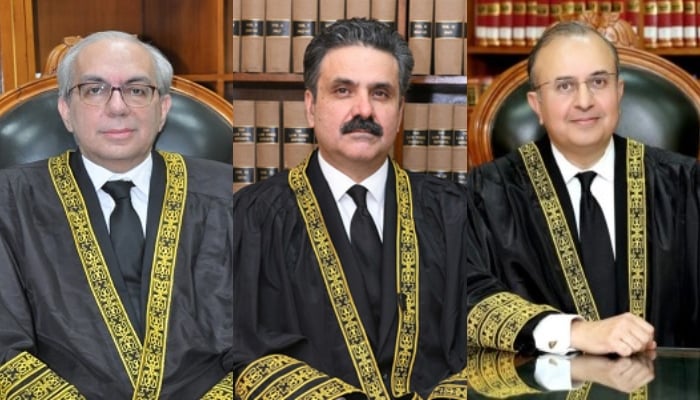Justice Akhtar returns to judges committee as CJP Afridi reconstitutes key panel
Reconstitution of three-member key panel comes after Justice Afridi's takes oath as CJP
Chief Justice of Pakistan (CJP) Yahya Afridi on Saturday included Justice Munib Akhtar back to the SC Practice and Procedure Committee which was established for the purpose of fixing cases and forming benches.
The reconstitution of the three-member key panel came after Justice Afridi's swearing in ceremony as Pakistan's 30th chief justice after Justice Qazi Faez Isa's retirement.
According to a notification, the chief justice will head the special bench formed by the judges committee under the SC (Practice and Procedure Act), 2023. He also included senior puisne judge Justice Mansoor Ali Shah and Justice Akhtar to the judges' committee.
On September 20, President Asif Ali Zardari approved the Supreme Court (Practice and Procedure) Amendment Ordinance 2024, allowing the CJP to pick any judge of the apex court to be the third member of the body.
Soon after the president's approval, then-CJP Isa exercised his powers under amended law and appointed Justice Amin-Ud-Din Khan to the judges' committee, replacing Justice Akhtar.
The ordinance, promulgated in September this year, empowers the chief justice to nominate a judge of his choice in the committee that constitutes the benches. As per the ordinance, the body will comprise the chief justice, the senior puisne and any judge nominated by the CJP.
Following Justice Akhtar's removal, Justice Shah wrote a letter to the secretary of the Supreme Court, expressing concerns over the ordinance.
Justice Mansoor, in his letter, noted that no reasons were given as to why the second senior most judge, Justice Akhtar, was removed from the composition of the committee. “Furthermore, no reasons were given why the next senior most judge was ignored and instead, the fourth senior most judge was nominated as a member of the Committee.”
“Such unfortunate cherry picking and undemocratic display of one-man show are precisely what the Act tried to discourage and replace-a stance that was upheld by the Full Court Bench of this Court in Raja Amer,” he wrote.
Justice Shah had also refused to become a member of special bench, stating he was unable to participate in the bench over his concerns regarding amendments to the practice law via ordinance.
In his October 23 letter, the senior judge also made his participation in the special bench conditional, saying that “until the full court bench determined the constitutional validity of the promulgation of the ordinance as well as of the amendments made thereby or the judges of the SC resolve to act upon these amendments in a full court meeting pending adjudication upon the constitutionality thereof, or the earlier committee comprising the HCJP and two senior most judges is restored, I will not participate in special benches formed by the new committee and will only attend sittings of the regular benches to hear the cases of ordinary litigants in the larger public interest."
Responding to Justice Shah's letter, then-CJP Isa had said legally he could not be asked about why he nominated a judge as the committee’s third member. Still, the then chief justice had provided the reasons for his action, saying he did it because he "always advocated accountability and transparency".
Moreover, the Supreme Judicial Council (SJC) was also reconstituted with CJP Afridi becoming the chairman. Earlier, the newly-appointed top judge was not part of the SJC.
The council also includes Justice Mansoor, Justice Akhtar and chief justices of the high courts.
-
Security forces gun down 30 terrorists in multiple IBOs in KP: ISPR
-
MQM-P calls for new province in Sindh
-
US report validates Pakistan military edge over India: PM
-
Banned TTP poses serious threat to Pakistan security: UNSC panel
-
CM Afridi clarifies remarks on by-poll after ECP requests army deployment
-
Dubai sees 3.2m Pakistani passengers in 2025 as airport sets new milestone
-
Security forces kill 23 Indian proxy terrorists in KP's Kurram
-
Pakistan to construct island to boost oil exploration: report












